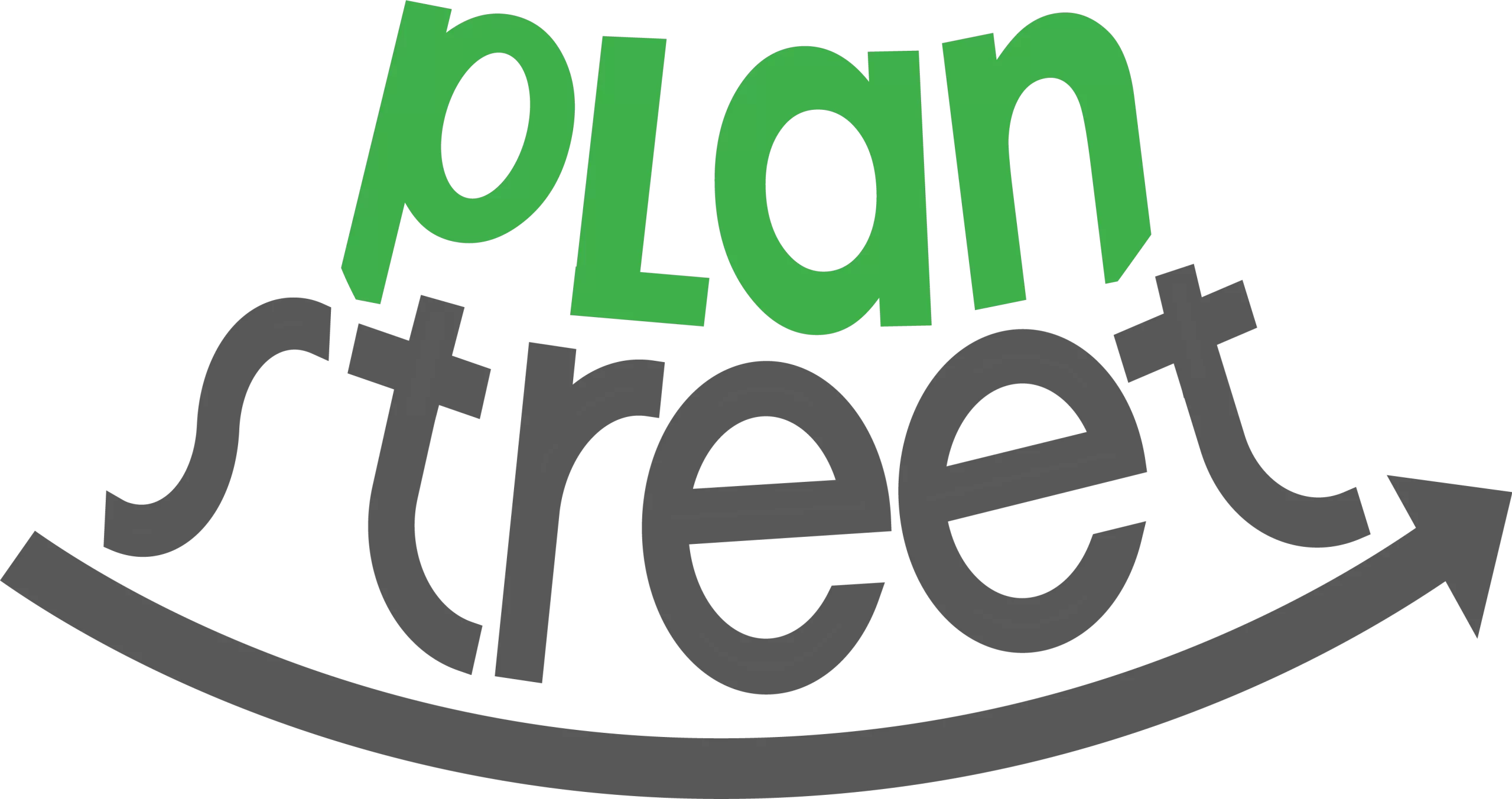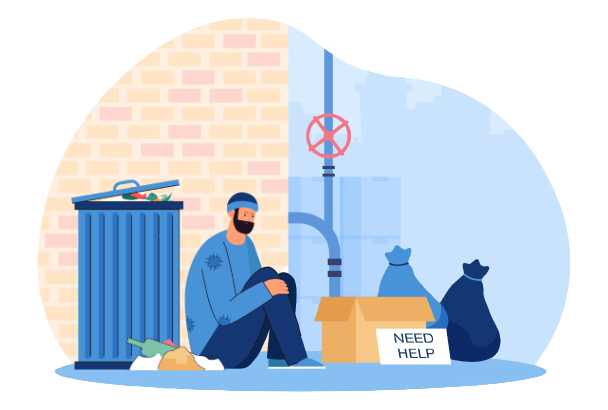The United States is still working to find a solution to the homelessness epidemic despite having more than 500,000 Americans without homes. Nearly 600,000 Americans didn't have a place to live in 2020 as a result of the Covid pandemic's increased jobless rate and housing cost boom.
A record-breaking $3 billion was spent by New York City in 2019 to assist its homeless population. California was anticipated to surpass its previous record by investing $4.8 billion over the following two years in the same problem.
Despite the expanding expenditure, there has been only a 10% improvement in total homelessness in the United States since 2007. It gets worse for some populations, like individuals who are homeless, where there was just a 1% decrease throughout that time.
Thankfully, a wide range of governmental and private groups offer homeless people and families different levels of support. In the United States, there are currently more than 11,000 groups offering community housing and shelter to those who are homeless.
Addressing Homelessness in the United States
Numerous population changes, alterations in the general population, and adjustments in societal views toward the impoverished excluded, and disenfranchised have all contributed to changes in the demographics of those who are homeless.
In the United States, homelessness is a highly dynamic and complex issue that has changed over time. Although we now have a better grasp of what causes homelessness and what solutions work best, we still have a lot to learn about this complicated problem.
While the numbers have typically been declining since 2010, in the United States, more than 550,000 people spent one night in shelters or other locations not meant for human habitation in 2017. Longer-term homelessness, such as that lasting a year or longer, affects a much larger number of people.
In 2016, 1.42 million people spent time in transitional housing or homeless shelter. The following information will help us understand the effects of homelessness on our health and the top grants that are helping fight homelessness in the United States.
Homelessness Leads to Adverse Health Outcomes
For those who are homeless, staying at a shelter for the homeless might have a significant impact on their health. According to studies, being homeless raises the likelihood of experiencing trauma, particularly as a result of physical assault or rape, as well as health issues such as skin illnesses and diseases of the extremities.
Additionally, outbreaks of tuberculosis have been recorded by the Centers for Disease Control and Prevention in two homeless shelters, one in Kane County, Illinois, and one in Duval County, Florida.
Investigations looking into the frequency of tuberculosis in a men's homeless shelter also discovered an infection rate of about 43% (positive PPD test, history of a positive PPD test, or active tuberculosis).
On the other hand, a number of behavioral or mental health issues can also result in homelessness. According to research, mental health issues and substance abuse both contribute to and are a result of homelessness.
According to the Office of National Drug Control Policy, 30 percent of people who are homeless on a long-term basis have a major mental disease.
Compared to the overall population, the community of single people suffering from homelessness has a higher prevalence of certain mental diseases such as depression, schizophrenia, substance misuse, alcoholism, and more.
SMI and substance abuse are frequently co-occurring disorders in the population of homeless people.
Top 10 Federal Homeless Assistance Grants in the US
There are a number of homelessness assistance programs in the US that give financing to municipal, state, and nonprofit organizations that help homeless people and families around the country.
Grants to nonprofit organizations that run programs for the homeless, including food banks, parenting classes, emergency services, and shelters. Every year, communities that manage housing and services locally receive Homeless Assistance Grants from the US Department of Housing and Urban Development (HUD).
Here are ten of the prominent homelessness assistance grants you may want to know about:
- Community Development Block Grant (CDBG) Program
- Continuum of Care Program (CoC)
- Emergency Solutions Grants Program (ESG)
- Family Unification Program (FUP) and Housing Choice Vouchers (HCV)
- Grants for the Benefit of Homeless Individuals (GBHI)
- HOME Investment Partnerships Program (HOME)
- Homeless Providers Grant and Per Diem Program (GPD)
- Housing Opportunities for Persons with AIDS (HOPWA)
- Housing Trust Fund (HTF)
- HUD-Veterans Affairs Supportive Housing Program (HUD-VASH)
1. Community Development Block Grant (CDBG) Program
The Community Development Block Grant (CDBG) Program provides yearly monetary assistance to localities to aid in the expansion of low- and moderate-income people’s access to affordable housing, livability, and economic opportunities.
The money can be used to build or improve public infrastructures, such as homeless shelters and rehabilitation centers, offer stable housing, lessen community blight and economic misery, provide access to public services, and more.
- Who funds CDBG? U.S. Department of Housing and Urban Development (HUD)
- Who can apply? Nonprofits, States, Local Governments
2. Continuum of Care Program (CoC)
The Continuum of Care (CoC) Program offers regions or municipalities extra financial aid to set up a planning body that coordinates the provision of services for homeless people.
To assist people and families who are homeless, CoCs carry out outreach, intake, and vulnerability assessments, and offer emergency shelter, temporary or permanent housing, and supportive services.
- Who funds CoC? U.S. Department of Housing and Urban Development (HUD)
- Who can apply? Nonprofits, States, Local Governments
3. Emergency Solutions Grants Program (ESG)
The Emergency Solutions Grants Program (ESG) is a formula grant program created to give individuals experiencing housing instability quick housing solutions and prevent homelessness through a number of strategies.
Street outreach, the management of emergency shelters and quick re-housing aid, the expansion or improvement of a community's shelter infrastructure, and the provision of homelessness prevention services are all possible with the help of ESG funds.
- Who funds ESG? U.S. Department of Housing and Urban Development (HUD)
- Who can apply? States, Territories, Local Governments
4. Family Unification Program (FUP) and Housing Choice Vouchers (HCV)
Housing Choice Vouchers (HCV), which provide rental assistance, are provided to families who lack suitable housing and young people who are leaving foster care through the Family Unification Program (FUP).
Public housing agencies and public child welfare agencies, which assist in determining eligibility for rental assistance, are responsible for administering these funds.
- Who funds FUP and HCV? U.S. Department of Housing and Urban Development (HUD)
- Who can apply? States, Territories, Local Governments
5. Grants for the Benefit of Homeless Individuals (GBHI)
The Grants for the Benefit of Homeless Individuals (GBHI) Program supports homeless people and families in their efforts to get help for their substance use problems.
Outreach, mental screening, substance use assessments, treatment for mental illness and substance use disorders, housing help, health insurance enrollment, and case management services may all be supported by GBHI money.
- Who funds GBHI? U.S. Department of Health and Human Services (HHS) and Substance Abuse and Mental Health Services Administration (SAMHSA)
- Who can apply? Nonprofits
6. HOME Investment Partnerships Program (HOME)
The largest federal block grant, the HOME Investment Partnerships Program (HOME), was created to assist state and local governments in providing low-income populations with affordable housing and encouraging homeownership.
This program is adaptable and enables recipients to use HOME funding for a wide range of initiatives, including direct loans to individuals, grants, rental assistance, loan guarantees, affordable home development, and home renovation.
- Who funds HOME? U.S. Department of Housing and Urban Development (HUD)
- Who can apply? States, Local Governments
7. Homeless Providers Grant and Per Diem Program (GPD)
Veterans experiencing homelessness are supported by community organizations with funds from the Grants and Per Diem (GPD) Program. Grants for capital improvements and case management are available through the GPD Program to assist homeless veterans in gaining housing stability as well as advancing their knowledge and earning potential.
A per diem of $60 a day per veteran shelter is available to recipients, which they can use to pay for services and operational expenses.
- Who funds GPD? U.S. Department of Veterans Affairs (VA)
- Who can apply? Nonprofits, States, Local Governments
8. Housing Opportunities for Persons with AIDS (HOPWA)
The Housing Opportunities for Persons with AIDS (HOPWA) Program provides financing to states, municipalities, and nonprofit organizations that offer housing assistance and social services to low-income people living with HIV/AIDS.
The AIDS Housing Opportunity Act established the program, which provides incentives and resources to assist local governments in formulating plans for assisting those living with HIV/AIDS to keep stable housing while simultaneously enhancing access to supportive services.
- Who funds HOPWA? U.S. Department of Housing and Urban Development (HUD)
- Who can apply? Nonprofits, States, Local Governments
9. Housing Trust Fund (HTF)
The Housing Trust Fund (HTF) supports the creation and preservation of affordable housing in states and state-designated entities.
With the help of new construction, redevelopment, restoration, and the purchase of new property, these grants can be utilized to create and sustain affordable housing. Affordable housing must be kept in HTF-assisted units for at least 30 years.
- Who funds HTF? U.S. Department of Housing and Urban Development (HUD)
- Who can apply? States, State-Designated Entities
10. HUD-Veterans Affairs Supportive Housing Program (HUD-VASH)
To assist veterans in keeping their permanent homes, the HUD-VASH program gathers money from HUD's HCV Program with in-depth case management and supportive services offered by the VA.
Veterans who participate in this program are given rental assistance as well as access to case management services, drug and alcohol rehab, employment aid, mental health care, and other resources to help them locate and maintain stable housing.
- Who funds HUD-VASH? U.S. Department of Veterans Affairs (VA) and The U.S. Department of Housing and Urban Development (HUD)
- Who can apply? Veterans
Other Top Homeless Assistance Grants
There are also other critical homeless assistance grants that you should know about. These include:
- Mental Health Awareness Training Grants (MHAT)
- Projects for Assistance in Transition from Homelessness (PATH)
- Runaway and Homeless Youth (RHY) Programs
- Rural Housing Stability Assistance Program (RHSP)
- Supportive Services for Veteran Families (SSVF)
- Title V Surplus Property Program (TITLE V)
- Transforming Lives Through Supported Employment Program
- Treatment for Individuals with Serious Mental Illness, Serious Emotional Disturbance, or Co-Occurring Disorders Experiencing Homelessness Program (TIEH)
- Youth Homelessness Demonstration Program (YHDP)

